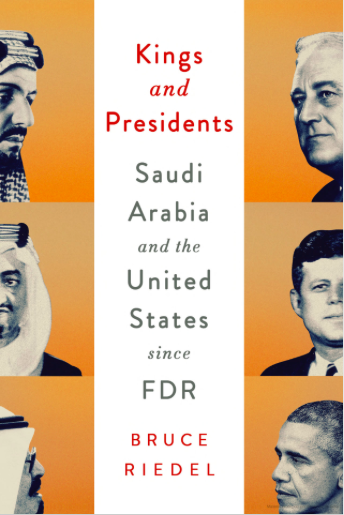Ruta de navegación
Menú de navegación
Blogs
Entries with label House of Saud .
[Bruce Riedel, Kings and Presidents. Saudi Arabia and the United States since FDR. Brookings Institution Press. Washington, 2018. 251 p.]
review / Emili J. Blasco
Oil in exchange for protection is the pact sealed in early 1945 between Franklin D. Roosevelt and King Abdulaziz bin Saud on board the USS Quincy, in the waters off Cairo, when the American president was returning from the Yalta lecture . Since then, the special relationship between the United States and Saudi Arabia has been one of the key elements of international politics. Today, fracking makes Arabian oil less necessary for Washington, but cultivating Saudi friendship continues to be of interest to the White House, even in an unorthodox presidency in diplomatic matters: the first country that Donald Trump visited as president was precisely Saudi Arabia.
The ups and downs in this relationship, due to the vicissitudes of the world, especially in the Middle East, have marked the tenor of the contacts between the various presidents of the United States and the corresponding monarchs of the House of Saud. This book by Bruce Riedel, a former CIA analyst and member of the U.S. National Security committee as a specialist on the region, now directs project Intelligence at the Brookings Institution think tank, is dedicated to analyzing the content of these relations, following the successive pairs of interlocutors between Washington and Riyadh.
In this relationship, the central position occupied by the Palestinian question is surprising. One might sometimes think that many Arab countries' invocation of the Israeli-Palestinian conflict is rhetorical, but Riedel notes that in the case of Saudi Arabia the issue is fundamental. It was part of the initial pact between Roosevelt and Abdulaziz bin Saud (the U.S. president pledged not to support the partition of Palestine to create the State of Israel without Arab consent, something that Truman did not respect, aware that Riyadh could not break with Washington because it needed U.S. oil companies) and since then it has appeared on every occasion.
 |
Progress or stalemates in the Arab-Israeli peace process, and the differing passion of Saudi kings on this issue, have directly shaped the relationship between U.S. administrations and the Saudi Monarchy. For example, Washington's support for Israel in the 1967 war resulted in the 1973 oil embargo; George Bush senior and Bill Clinton's efforts for a peace agreement helped a close relationship with King Fahd and Crown Prince Abdullah; the latter, on the other hand, led to a cooling off in the face of the disinterest shown by George Bush junior. "A vibrant and effective peace process will help cement a strong relationship between king and president; a stalled and exhausted process will damage their connection."
Will this issue continue to be a defining one for the new generations of Saudi princes? "The Palestinian cause is deeply popular in Saudi society, especially in the clerical establishment. The House of Saud has made the creation of a Palestinian state, with Jerusalem as its capital, emblematic of its policy since the 1960s. A generational change is unlikely to alter that fundamental stance."
In addition to this, there are two other aspects that have proven to be disruptive in the Washington-Riyadh entente: Wahhabism promoted by Saudi Arabia and the US demand for political reforms in the Arab world. Riedel asserts that, given the foundational alliance between the House of Saud and this strict Sunni variant of Islam, which Riyadh has promoted in the world to ingratiate itself with its clerics, as compensation each time it has had to bow to the demands of the impious United States, there is no room for a rupture between the two bodies. "Saudi Arabia cannot abandon Wahhabism and survive in its present form," he warns.
Thus, the book ends with a rather pessimistic outlook on the change -democratization, respect for human rights- that Saudi Arabia is facing from the international community (certainly without much insistence, in the case of the United States). Not only was Riyadh the "major player" in the counter-revolution at the time of the Arab Spring, but it may be a factor going against a positive evolution of the Middle East. "Superficially it appears that Saudi Arabia is a force for order in the region, someone who is trying to prevent chaos and disorder. But in the long run deadline, by trying to maintain an unsustainable order, forcibly enforced by a police state, the kingdom could, in fact, be a force for chaos."
Riedel has personally dealt with prominent members of the Saudi royal family. Despite a close relationship with some of them, especially Prince Bandar bin Sultan, who served as ambassador to the United States for more than twenty years, the book does not patronize Saudi Arabia in the disputes between Washington and Riyadh. More critical of George W. Bush than of Barack Obama, Riedel also points out the latter's inconsistencies in his Middle East policies.
